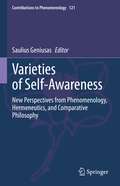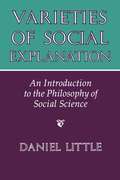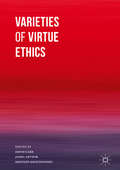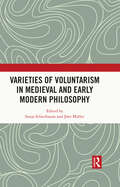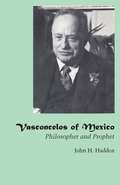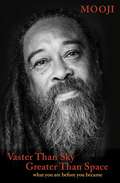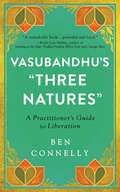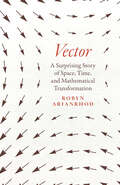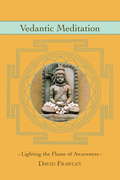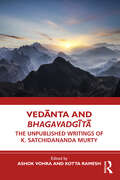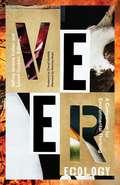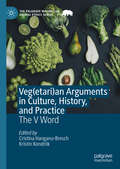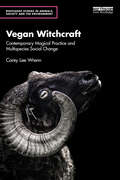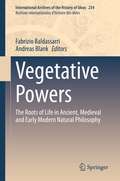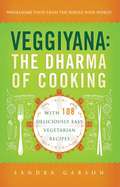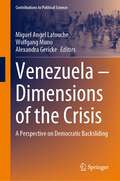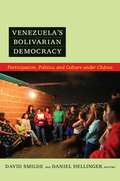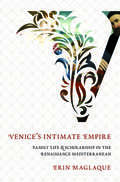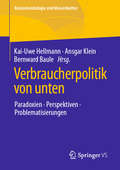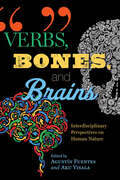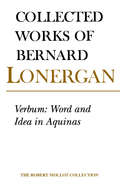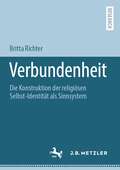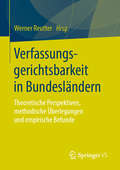- Table View
- List View
Varieties of Self-Awareness: New Perspectives from Phenomenology, Hermeneutics, and Comparative Philosophy (Contributions to Phenomenology #121)
by Saulius GeniusasThis collection of chapters, written by prominent scholars in their respective fields, re-examines the nature of self-awareness in both Western and Eastern philosophy, inquires into its diverse and variable modes, and significantly broadens the framework of its analysis. The chapters collected focus on reflective and pre-reflective forms of self-awareness, as well as the relation between self-awareness and the awareness of things and the world. Included are examinations of the affective and embodied dimensions of self-awareness, the distinct forms of self-awareness in memory, phantasy, and dreams, as well as the temporal and spatial nature of self-awareness. This edited volume appeals to students and researchers working in phenomenology and on the philosophy of self-awareness.
Varieties of Social Explanation: An Introduction to the Philosophy of Social Science
by Daniel LittleProfessor Little presents an introduction to the philosophy of social science with an emphasis on the central forms of explanation in social science: rational-intentional, causal, functional, structural, materialist, statistical and interpretive. The book is very strong on recent developments, particularly in its treatment of rational choice theory, microfoundations for social explanation, the idea of supervenience, functionalism, and current discussions of relativism.Of special interest is Professor Little's insight that, like the philosophy of natural science, the philosophy of social science can profit from examining actual scientific examples. Throughout the book, philosophical theory is integrated with recent empirical work on both agrarian and industrial society drawn from political science, sociology, geography, anthropology, and economics.Clearly written and well structured, this text provides the logical and conceptual tools necessary for dealing with the debates at the cutting edge of contemporary philosophy of social science. It will prove indispensible for philosophers, social scientists and their students.
Varieties of Virtue Ethics
by David Carr Kristján Kristjánsson James ArthurThis book explores recent developments in ethics of virtue. While acknowledging the Aristotelian roots of modern virtue ethics - with its emphasis on the moral importance of character - this collection recognizes that more recent accounts of virtue have been shaped by many other influences, such as Aquinas, Hume, Nietzsche, Hegel and Marx, Confucius and Lao-tzu. The authors also examine the bearing of virtue ethics on other disciplines such as psychology, sociology and theology, as well as attending to some wider public, professional and educational implications of the ethics of virtue. This pioneering book will be invaluable to researchers and students concerned with the many contemporary varieties and applications of virtue ethics.
Varieties of Voluntarism in Medieval and Early Modern Philosophy
by Jörn Müller Sonja SchierbaumThis book considers different forms of voluntarism developed from the thirteenth to eighteenth centuries. By crossing the conventional dividing line between the medieval and early modern periods, the volume draws important new insights on the historical development of voluntarism. Voluntarism places a special emphasis on the will when it comes to the analysis and explanation of fundamental philosophical questions and problems. Since the Middle Ages, voluntarist considerations and views played an important role in the development of different theories of action, ethics, metaethics, and metaphysics. The chapters in this volume are grouped according to three distinct kinds of voluntarism: psychological, ethical, and theological voluntarism. They address topics such as the threat of irrationality as the standard objection to voluntarism, incontinent actions and their explanation, the nature of the will as rational appetite, the relationship between intellect and will, the implications of conceptions of the will for political freedom, and the relations between divine freedom and the modal status of eternal truths. The chapters not only consider towering figures of the Middle Ages—Thomas Aquinas, Henry of Ghent, William of Ockham, Francisco de Vitoria—and early modern period—René Descartes, Thomas Hobbes, Gottfried Wilhelm Leibniz, Samuel Pufendorf—but also engage with less well-known figures such as Peter John Olivi, John of Pouilly, Catharine Trotter Cockburn, and Christian August Crusius. Varieties of Voluntarism in Medieval and Early Modern Philosophy will appeal to scholars and advanced students working in medieval philosophy, early modern philosophy, the history of ethics, and philosophy of religion.
Vasconcelos of Mexico: Philosopher and Prophet
by John H. HaddoxJosé Vasconcelos--lawyer, politician, writer, educator, philosopher, prophet, and mystic--was one of the most influential and controversial figures in the intellectual life of twentieth-century Mexico. Vasconcelos was driven by the desire to gain a complete and comprehensive vision of reality, employing his own aesthetic-emotive method and a poetic mode of expression. The complex philosophical system that resulted is what he called "aesthetic monism. " But this is only one side of the man. Vasconcelos was also vitally interested in both the proximate realities and remote possibilities of Mexico, in the character of the "cosmic race" of his homeland, and in the relations between his own country and the others of this hemisphere. Soon after Vasconcelos's death in 1959, Eduardo García Máynez spoke of him, in a moving tribute, as "without question the most inspiring intellectual and human figure that Mexico has produced. " Unhappily--and perhaps disgracefully--he has remained almost unknown outside the Spanish-speaking world. Histories of Mexico published in English usually give passing mention to his role as Minister of Public Education or his unsuccessful campaign for the presidency, but his aesthetic system and his socio-political ideas have been ignored by philosophers in the United States. Here, for the first time, is a unified, inclusive, and occasionally critical presentation of the entire range of Vasconcelos's thought, from his metaphysics and theory of knowledge through his aesthetics and ethics to his social and political philosophy. It is enriched by an appendix in which the most significant passages from Vasconcelos's own philosophical writings are presented in English translations. José Vasconcelos - lawyer, politician, writer, educator, philosopher, prophet, and mystic - was one of the most influential and controversial figures in the intellectual life of twentieth-century Mexico. Vasconcelos was driven by the desire to gain a complete and comprehensive vision of reality, employing his own aesthetic-emotive method and a poetic mode of expression. The complex philosophical system that resulted is what he called "aesthetic monism". But this is only one side of the man. Vasconcelos was also vitally interested in both the proximate realities and remote possibilities of Mexico, in the character of the "cosmic race" of his homeland, and in the relations between his own country and the others of this hemisphere. Soon after Vasconcelos's death in 1959, Eduardo García Máynez spoke of him, in a moving tribute, as "without question the most inspiring intellectual and human figure that Mexico has produced". Unhappily - and perhaps disgracefully - he has remained almost unknown outside the Spanish-speaking world. Histories of Mexico published in English usually give passing mention to his role as Minister of Public Education or his unsuccessful campaign for the presidency, but his aesthetic system and his socio-political ideas have been ignored by philosophers in the United States. Here, for the first time, is a unified, inclusive, and occasionally critical presentation of the entire range of Vasconcelos's thought, from his metaphysics and theory of knowledge through his aesthetics and ethics to his social and political philosophy. It is enriched by an appendix in which the most significant passages from Vasconcelos's own philosophical writings are presented in English translations.
Vaster Than Sky, Greater Than Space: What You Are Before You Became
by MoojiIn ever-growing gatherings worldwide, the revered teacher Mooji has opened the eyes of thousands through his rare ability to shine light on the ineffable with uncommon clarity, humor, and warmth. Now, with Vaster Than Sky, Greater Than Space, Mooji invites and inspires readers everywhere to discover the true essence from which we all arise. The Advaita Vedanta tradition teaches that through simple questioning and introspection, we can awaken to something far greater than the ego self, a nondual Oneness with the ground of Being. In Vaster Than Sky, Greater Than Space, Mooji guides us into the adventure of deep inquiry, sparking direct Self-realization through parables, insights, wisdom teachings, and responses to the common questions of readers. Through our own engagement and self-exploration, Mooji helps us to arrive at the answers, not from the limited perspective in which we've been conditioned, but from our own deepest Knowing--revealing the timeless, boundless love and freedom that is the natural perfume of the Absolute.
Vasubandhu's "Three Natures": A Practitioner's Guide for Liberation
by Ben ConnellyIn this book, Ben Connelly shows the power of integrating early Buddhist psychology with the Mahayana emphasis on collective liberation. You&’ll discover how wisdom from fourth-century India can be harnessed to heal and transform systems of harm within ourselves and our communities. The three natures (svabhavas)—the imaginary, dependent, and complete, realized natures—are inherent aspects of all phenomena. The imaginary nature of things is what we think they are. Their dependent nature is that they appear to arise from countless conditions. The complete, realized nature is that they aren&’t as we imagine them to be: things that can be grasped or pushed away. The three natures form the backbone of Yogacara philosophy, and by showing us how to see beyond our preconceived notions of ourselves and others, beyond the things that we&’re convinced are &“true,&” they open up a path to personal and communal healing. Dive into this empowering approach to freedom from suffering, from harmful personal and social patterns, and to finding peace and joyfulness in the present.
Vaulting Ambition: Sociobiology and the Quest for Human Nature
by Philip KitcherVaulting Ambitionis the first extensive and detailed evaluation of the controversial claims that sociobiologists have made about human nature and human social behavior. It raises the "sociobiology debate" to a new level, moving beyond arguments about the politics of the various parties involved, the degree to which sociobiology assumes genetic determinism, or the falsifiability of the general theory. Sociobiology has made a great deal of noise in the popular intellectual culture. Vaulting Ambition cuts through the charges and counter-charges to take a hard look at the claims and analyses offered by the sociobiologists. It examines what the claims mean, how they relate to standard evolutionary theory, how the biological models are supposed to work, and what is wrong with the headline-grabbing proclamations of human sociobiology. In particular, it refutes the notions that humans are trapped by their evolutionary biology and history in endlessly repeating patterns of aggression, xenophobia, and deceitfulness, or that the inequities of sex, race, and class are genetically based or culturally determined. And it takes up issues of human altruism, freedom, and ethics as well. Kitcher weighs the evidence for sociobiology, for human sociobiology, and for "the pop sociobiological view" of human nature that has engendered the controversy. He concludes that in the field of nonhuman animal studies, rigorous and methodologically sound work about the social lives of insects, birds, and mammals has been done. But in applying the theories to human beings-where even more exacting standards of evidence are called for because of the potential social disaster inherent in adopting a working hypothesis as a basis for public policy - many of the same scientists become wildly speculative, building grand conclusions from what Kitcher shows to be shoddy analysis and flimsy argument. While it may be possible to develop a genuine science of human behavior based on evolutionary biology, genetics, cognition, and culture, Kitcher points out that the sociobiology that has been loudly advertised in the popular and intellectual press is not it. Pop sociobiology has in fact been felled by its overambitious and overreaching creators.
Vector: A Surprising Story of Space, Time, and Mathematical Transformation
by Robyn ArianrhodA celebration of the seemingly simple idea that allowed us to imagine the world in new dimensions—sparking both controversy and discovery. The stars of this book, vectors and tensors, are unlikely celebrities. If you ever took a physics course, the word “vector” might remind you of the mathematics needed to determine forces on an amusement park ride, a turbine, or a projectile. You might also remember that a vector is a quantity that has magnitude and (this is the key) direction. In fact, vectors are examples of tensors, which can represent even more data. It sounds simple enough—and yet, as award-winning science writer Robyn Arianrhod shows in this riveting story, the idea of a single symbol expressing more than one thing at once was millennia in the making. And without that idea, we wouldn’t have such a deep understanding of our world. Vector and tensor calculus offers an elegant language for expressing the way things behave in space and time, and Arianrhod shows how this enabled physicists and mathematicians to think in a brand-new way. These include James Clerk Maxwell when he ushered in the wireless electromagnetic age; Einstein when he predicted the curving of space-time and the existence of gravitational waves; Paul Dirac, when he created quantum field theory; and Emmy Noether, when she connected mathematical symmetry and the conservation of energy. For it turned out that it’s not just physical quantities and dimensions that vectors and tensors can represent, but other dimensions and other kinds of information, too. This is why physicists and mathematicians can speak of four-dimensional space-time and other higher-dimensional “spaces,” and why you’re likely relying on vectors or tensors whenever you use digital applications such as search engines, GPS, or your mobile phone. In exploring the evolution of vectors and tensors—and introducing the fascinating people who gave them to us—Arianrhod takes readers on an extraordinary, five-thousand-year journey through the human imagination. She shows the genius required to reimagine the world—and how a clever mathematical construct can dramatically change discovery’s direction.
Vedantic Meditation
by David Frawley John DouillardAs yoga gains popularity across the U.S., many people are becoming interested in its traditional Vedic roots. While Buddhist meditation is well represented on bookshelves, there has been little Vedantic philosophy written in lay terms until now. Author David Frawley guides readers through the challenges of cultivating awareness, calming the mind, and practicing meditation according to Vedanta and Hinduism. He examines how cultural knowledge systems in the West lead individuals to disillusionment, and speaks about how meditation can aid in understanding the true nature of one's thoughts, emotions, and perceptions. Frawley explores meditation support practices such as yoga, mantras, kundalini, and pranayama, as well as the role of gurus, and concludes with a short, more technical essay on self-inquiry.
Vedānta and Bhagavadgītā: The Unpublished Writings of K. Satchidananda Murty
by Ashok Vohra and Kotta RameshKotta Satchidananda Murty (1924–2011), also known as Satchidananda, KSM, Murty, was a vociferous writer and an iconoclast. This volume is a collection of his unpublished writings. It includes Murty’s views on the Veda, its meaning, relevance and study, and shows the significance of the Vedāntic vision to the modern world. Murty elucidates the basic tenets of Advaita Vedānta and expounds the Advaitic doctrine of the relationships between Brahman and God, Brahman and the individual self, as well as God and the world. In his writings, Murty contrasts empirical knowledge with transcendental wisdom and surveys the history of Indian science and scientific views in ancient times. The book also includes Murty’s musings on the scholar Śaṅkarācārya’s philosophy, authorship and religious life. An important contribution to Indian philosophy, the volume will be of great interest to scholars, teachers and students of Hindu philosophy, Bhagavadgītā, Vedāntic philosophy, Advaita Vedānta, comparative philosophy, religious studies, and South Asian studies.
Veer Ecology: A Companion for Environmental Thinking
by Jeffrey Jerome Cohen Lowell DuckertThe words most commonly associated with the environmental movement—save, recycle, reuse, protect, regulate, restore—describe what we can do to help the environment, but few suggest how we might transform ourselves to better navigate the sudden turns of the late Anthropocene. Which words can help us to veer conceptually along with drastic environmental flux? Jeffrey Jerome Cohen and Lowell Duckert asked thirty brilliant thinkers to each propose one verb that stresses the forceful potential of inquiry, weather, biomes, apprehensions, and desires to swerve and sheer. Each term is accompanied by a concise essay contextualizing its meaning in times of resource depletion, environmental degradation, and global climate change.Some verbs are closely tied to natural processes: compost, saturate, seep, rain, shade, sediment, vegetate, environ. Many are vaguely unsettling: drown, unmoor, obsolesce, power down, haunt. Others are enigmatic or counterintuitive: curl, globalize, commodify, ape, whirl. And while several verbs pertain to human affect and action—love, represent, behold, wait, try, attune, play, remember, decorate, tend, hope—a primary goal of Veer Ecology is to decenter the human. Indeed, each of the essays speaks to a heightened sense of possibility, awakening our imaginations and inviting us to think the world anew from radically different perspectives. A groundbreaking guide for the twenty-first century, Veer Ecology foregrounds the risks and potentialities of living on—and with—an alarmingly dynamic planet.Contributors: Stacy Alaimo, U of Texas at Arlington; Joseph Campana, Rice U; Holly Dugan, George Washington U; Lara Farina, West Virginia U; Cheryll Glotfelty, U of Nevada, Reno; Anne F. Harris, DePauw U; Tim Ingold, U of Aberdeen; Serenella Iovino, U of Turin; Stephanie LeMenager, U of Oregon; Scott Maisano, U of Massachusetts, Boston; Tobias Menely, U of California, Davis; Steve Mentz, St. John&’s U; J. Allan Mitchell, U of Victoria; Timothy Morton, Rice U; Vin Nardizzi, U of British Columbia; Laura Ogden, Dartmouth College; Serpil Opperman, Hacettepe U, Ankara; Daniel C. Remein, U of Massachusetts, Boston; Margaret Ronda, U of California, Davis; Nicholas Royle, U of Sussex; Catriona Sandilands, York U; Christopher Schaberg, Loyola U; Rebecca R. Scott, U of Missouri; Theresa Shewry, U of California, Santa Barbara; Mick Smith, Queen&’s U; Jesse Oak Taylor, U of Washington; Brian Thill, Golden West College; Coll Thrush, U of British Columbia, Vancouver; Cord J. Whitaker, Wellesley College; Julian Yates, U of Delaware.
Veg: The V Word (The Palgrave Macmillan Animal Ethics Series)
by Cristina Hanganu-Bresch Kristin KondrlikThis collection explores the arguments related to veg(etari)anism as they play out in the public sphere and across media, historical eras, and geographical areas. As vegan and vegetarian practices have gradually become part of mainstream culture, stemming from multiple shifts in the socio-political, cultural, and economic landscape, discursive attempts to both legitimize and delegitimize them have amplified. With 12 original chapters, this collection analyses a diverse array of these legitimating strategies, addressing the practice of veg(etari)anism through analytical methods used in rhetorical criticism and adjacent fields. Part I focuses on specific geo-cultural contexts, from early 20th century Italy, Serbia and Israel, to Islam and foundational Yoga Sutras. In Part II, the authors explore embodied experiences and legitimation strategies, in particular the political identities and ontological consequences coming from consumption of, or abstention from, meat. Part III looks at the motives, purposes and implication of veg(etari)anism as a transformative practice, from ego to eco, that should revolutionise our value hierarchies, and by extension, our futures. Offering a unique focus on the arguments at the core of the veg(etari)an debate, this collection provides an invaluable resource to scholars across a multitude of disciplines.
Vegan Witchcraft: Contemporary Magical Practice and Multispecies Social Change. (Routledge Studies in Animals, Society and the Environment)
by Corey Lee WrennVegan Witchcraft is the first book to blend theories of animal rights, feminism, and modern witchcraft in pursuit of total liberation.Perhaps the most foundational of all ethics in modern witchcraft is the creed "Do no harm." Despite this, multispecies suffering persists in nonvegan witchcraft. Vegan Witchcraft examines this intriguing conflict, unpacking the role of Nonhuman Animals in modern witchcraft from a vegan feminist perspective to illuminate inequalities that persist in alternative spiritual practices in the West. Recognizing Nonhuman Animals as comrades instead of consumables, vegan witchcraft confronts the harm imposed on nature, humans, and other animals, and identifies witchery as a powerful conduit for social change that draws its energy from plant-based foods, multispecies solidarity, and feminine power. The book critically analyzes popular witchcraft pathways in Britain and America to interrogate the many ways in which Nonhuman Animals are overlooked, objectified, or exploited, highlighting theological inconsistencies and missed opportunities that might be overcome to create a stronger practice for women and their communities. It reimagines witchcraft practice and lore to manifest justice and compassion for fellow humans, Nonhuman Animals, and nature. Veganism is advanced as a magical practice of self-care, community responsibility, conscious consumption, societal transformation, and environmental protection. The book calls for the redirection of the modern witch’s path toward a just world and away from the systematic symbolic and material exploitation of Nonhuman Animals that permeates witchcraft today.This book will be essential reading for those interested in critical animal studies, animal rights, ecofeminism, vegan religious studies, environmental philosophy, and witchcraft.
Vegetative Powers: The Roots of Life in Ancient, Medieval and Early Modern Natural Philosophy (International Archives of the History of Ideas Archives internationales d'histoire des idées #234)
by Andreas Blank Fabrizio BaldassarriThe volume analyzes the natural philosophical accounts and debates concerning the vegetative powers, namely nutrition, growth, and reproduction. While principally focusing on the early modern approaches to the lower functions of the soul, readers will discover the roots of these approaches back to the Ancient times, as the volume highlights the role of three strands that help shape the study of life in the Medieval and early modern natural philosophies. From late antiquity to the early modern period, the vegetative soul and its cognate concepts have played a substantial role in specifying life, living functions, and living bodies, sometimes blurring the line between living and non-living nature, and, at other moments, resulting in a strong restriction of life to a mechanical system of operations and powers. Unearthing the history of the vegetative soul as a shrub of interconnected concepts, the 24 contributions of the volume fill a crucial gap in scholarship, ultimately outlining the importance of vegetal processes of incessant proliferation, generation, and organic growth as the roots of life in natural philosophical interpretations.
Veggiyana
by Michelle Antonisse Sandra GarsonThe kitchen is the most vital place on Earth, because survival, even now in the age of iPads and large hadron colliders, still depends on wholesome, nutritious food. In keeping with this simple truth Veggiyana provides 108 tasty, beloved and simple recipes from around the world. And generously sprinkled throughout--like the perfect blend of herbs and spices are morsels of time-tested wisdom on how to live a life that nourishes both body and spirit. Veggiyana brings the vitality of the worlds kitchens to your own with wisdom and recipes to delight and inspire.
Venezuela – Dimensions of the Crisis: A Perspective on Democratic Backsliding (Contributions to Political Science)
by Wolfgang Muno Miguel Angel Latouche Alexandra GerickeThe book is devoted to the subject of Venezuela's politics and the different dimensions of its longstanding crisis, with various researchers exchanging ideas on the current problems affecting the country. It is the first comprehensive overview on the dimensions of Venezuela’s current crisis written in English, thus filling an important research gap. Especially the participation of international, well-known scholars make it a global enterprise. The book covers historical and theoretical facts surrounding the case of Venezuela and also focuses on the parties and actors that play decisive roles in the conflict. Subjects include the military, public administration, ideology, the opposition, the party landscape along with its crisis and Venezuela's oil policy. Furthermore the book touches upon international and regional aspects: Venezuela's diplomatic relations with the EU, the USA, Cuba and Colombia, respectively. The volume addresses a wider audience, such as scholars on Latin American and especially Venezuelan Politics, International Relations, as well as an interested public, including journalists and politicians.
Venezuela's Bolivarian Democracy: Participation, Politics, and Culture Under Chávez
by David Smilde Daniel HellingerVenezuela's Bolivarian Democracy brings together a variety of perspectives on participation and democracy in Venezuela. An interdisciplinary group of contributors focuses on the everyday lives of Venezuelans, examining the forms of participation that have emerged in communal councils, cultural activities, blogs, community media, and several other forums. The essays validate many of the critiques of democracy under Chvez, as well as much of the praise. They show that while government corporatism and clientelism are constant threats, the forms of political and cultural participation discussed are creating new discourses, networks, and organizational spaces--for better and for worse. With open yet critical minds, the contributors seek to analyze Venezuela's Bolivarian democratic experience through empirical research. In doing so, they reveal a nuanced process, a richer and more complex one than is conveyed in international journalism and scholarship exclusively focused on the words and actions of Hugo Chvez. Contributors Carolina Acosta-Alzuru Julia Buxton Luis Duno Gottberg Sujatha Fernandes Mara Pilar Garca-Guadilla Kirk A. Hawkins Daniel Hellinger Michael E. Johnson Luis E. Lander Margarita Lpez-Maya Elizabeth Gackstetter Nichols Coraly Pagan Guillermo Rosas Naomi Schiller David Smilde Alejandro Velasco
Venice's Intimate Empire: Family Life and Scholarship in the Renaissance Mediterranean
by Erin MaglaqueMining private writings and humanist texts, Erin Maglaque explores the lives and careers of two Venetian noblemen, Giovanni Bembo and Pietro Coppo, who were appointed as colonial administrators and governors. In Venice’s Intimate Empire, she uses these two men and their families to showcase the relationship between humanism, empire, and family in the Venetian Mediterranean.Maglaque elaborates an intellectual history of Venice’s Mediterranean empire by examining how Venetian humanist education related to the task of governing. Taking that relationship as her cue, Maglaque unearths an intimate view of the emotions and subjectivities of imperial governors. In their writings, it was the affective relationships between husbands and wives, parents and children, humanist teachers and their students that were the crucible for self-definition and political decision making. Venice’s Intimate Empire thus illuminates the experience of imperial governance by drawing connections between humanist education and family affairs. From marriage and reproduction to childhood and adolescence, we see how intimate life was central to the Bembo and Coppo families’ experience of empire. Maglaque skillfully argues that it was within the intimate family that Venetians’ relationships to empire—its politics, its shifting social structures, its metropolitan and colonial cultures—were determined.
Verantwortungsvolle Digitalität: Warum wir den digitalen Wandel gestalten sollten
by Christoph BöhmDigitale Produkte, Dienste sowie Kommunikationsformen zeichnen sich besonders dadurch aus, dass sie im physikalischen Sinne immateriell sind. Aus dieser Eigenschaft folgen vielfältige Möglichkeiten, Lebenspraktiken und Lebenswelten individuell zu gestalten. Leicht zu verbreitende Digitalprodukte vermitteln gesteigerte Wirksamkeitserfahrung, welche den Digitalen Wandel wirtschaftlich, technisch und gesellschaftlich in Gang hält. Wachstumsgrenzen scheinen durch disruptive Innovationen der Künstlichen Intelligenz, der digitalen Vernetzung sowie auch der Virtualisierung von Lebenswelten zu diffundieren. Ein systemischer Blick auf die Veränderungsdynamiken führt zur Einsicht, dass Anerkennungswettläufe zur Sicherung der sozialen Position entbrennen. Um einer Abwärtsspirale zu entfliehen, fühlen sich Individuen sowie wirtschaftliche Akteure genötigt, Verwirklichungschancen der Digitaltechnologie ergreifen zu müssen, da ansonsten die Todeserfahrung einer sozialen oder wirtschaftlichen Irrelevanz droht. Diesem Krisenphänomen setzt das Buch eine Idee entgegen, wie aus selbstfürsorglicher Integrität heraus eine lebensdienliche und vor allem gerechte Digitalität verwirklicht werden könnte.
Verbraucherpolitik von unten: Paradoxien, Perspektiven, Problematisierungen (Konsumsoziologie und Massenkultur)
by Ansgar Klein Kai-Uwe Hellmann Bernward BauleVerbraucherpolitik wurde in Deutschland seit ihrem Bestehen in den 1950er Jahren vorwiegend als ein Aktions‐ und Maßnahmenbündel verstanden und betrieben, das in erster Linie staatlicherseits initiiert und institutionalisiert wurde. Oftmals auch wurden von Staats wegen entsprechende Aufträge erteilt und Fördermodelle aufgesetzt, wodurch ein Erscheinungsbild entstand, als ob man es im Grunde nur mit einer durch die Makropolitik verordneten ‚Verbraucherpolitik von oben‘ herab zu tun hätte. Nicht, dass in diesen zurückliegenden Jahrzehnten nicht auch immer wieder Versuche unternommen worden wären, verbraucherpolitische Anstöße aus der Mitte der Zivilgesellschaft – oft in Gestalt kleiner Bürgerinitiativen – zu geben. Und gerade in den letzten Jahren sind einige neue Verbraucherorganisationen entstanden, die ungleich basisnäher operieren. Dennoch scheint sich bei den großen, regierungsnahen ‚Playern‘ im Feld, die schon jahrzehntelang im ‚Geschäft‘ sind, von der regierungsinternen Verbraucherpolitik ganz zu schweigen, der Eindruck festgesetzt zu haben, Verbraucherpolitik betreffe ein Politikfeld, das im Wesentlichen durch eine Kollaboration von Staat einerseits, sämtliche Verbraucher und Verbraucherinnen gleichermaßen vertretenden Verbraucherschutzorganisationen andererseits bestellt wird, während die vielen kleinen Verbraucherinitiativen, von einzelnen engagierten Verbrauchern oder Verbraucherinnen gar nicht erst angefangen, demgegenüber regelmäßig ins Hintertreffen geraten. Diese Perspektive bezieht sich größtenteils auf die Sicht auf und aus dem Zentrum der Politik heraus. Diesem institutionell vorherrschenden Eindruck, es gäbe im Prinzip nur ‚Verbraucherpolitik von oben‘, die wirklich schlag‐ und durchsetzungsfähig sei, soll mit diesem Band ein Stück weit entgegengewirkt werden.
Verbs, Bones, and Brains: Interdisciplinary Perspectives on Human Nature
by Agustín Fuentes and Aku Visala&“A benchmark collection of essays on the contemporary understanding of human nature. . . . [engaging] biology and anthropology to theology and philosophy.&” —Robin W. Lovin, Cary M. Maguire University Professor of Ethics emeritus, Southern Methodist University, author of What Do We Do When No One is Listening: Leading the Church in a Polarized Society The last few decades have seen an unprecedented surge of empirical and philosophical research into the evolutionary history of Homo sapiens, the origins of the mind/brain, and human culture. This research has sparked heated debates about the nature of human beings and how knowledge about humans from the sciences and humanities should be properly understood. The goal of Verbs, Bones, and Brains: Interdisciplinary Perspectives on Human Nature is to engage these themes and present current debates, discussions, and discourse for a range of readers. The contributors bring the discussion to life with key experts outlining major concepts paired with cross-disciplinary commentaries in order to create a novel approach to thinking about, and with, human natures. Throughout, they emphasize the importance of seeking a convergence in our views on human nature, despite metaphysical disagreements. They caution that if convergence eludes us and a common ground cannot be found, this is itself a relevant result: it would reveal to us how deeply our questions about ourselves are connected to our basic metaphysical assumptions. Instead, their focus is on how the interdisciplinary and possibly transdisciplinary conversation can be enhanced in order to identify and develop a common ground on what constitutes human nature. &“A landmark volume. . . . It shows the fruitfulness of a mutually respectful and yet rigorous approach to cross-disciplinary engagement.&” (William Storrar, Center of Theological Inquiry, Princeton, NJ, editor of A World for All?: Global Civil Society in Political Theory and Trinitarian Theology &“Fascinating, well-organized, and well-edited.&” —Choice
Verbum: Word and Idea in Aquinas, Volume 2
by Bernard Lonergan Robert Doran, S.J. Frederick Crowe, S.J.Bernard Lonergan's theological writings have influenced religious scholars ever since the first publication in the 1940s of the series of five articles which make up Verbum: Word and Idea in Aquinas. These articles first appeared in Theological Studies and were subsequently republished in book form in 1967 under the present title. This volume contains a new preface by the editors and full translations of all Latin texts.Verbum: Word and Idea in Aquinas is a product of Lonergan's eleven years of study of the thought of Thomas Aquinas. The work is considered by many to be a breakthrough in the history of Lonergan's theology and a foundation upon which his later contributions were constructed. Here he interprets aspects in the writing of Aquinas relevant to trinitarian theory and, as in most of Lonergan's work, one of the principal aims is to assist the reader in the search to understand the workings of the human mind.Verbum: Word and Idea in Aquinas is a vital component of Lonergan's oeuvre, and of continuing relevance to trinitarian theology, Aquinas studies, and inquiries into human cognition.Bernard Lonergan (1904-1984), a professor of theology, taught at Regis College, Harvard University, and Boston College. An established author known for his Insight and Method in Theology, Lonergan received numerous honorary doctorates, was a Companion of the Order of Canada in 1971 and was named as an original members of the International Theological Commission by Pope Paul VI.
Verbundenheit: Die Konstruktion der religiösen Selbst-Identität als Sinnsystem
by Britta RichterIst Verbundenheit, wie Studien nahelegen, die Essenz von Spiritualität? Und wie könnte ein Religionsmodell aussehen, das auf Verbundenheit als religiöse Bewusstseinsqualität aufbaut? Auf Basis qualitativer Daten aus Interviews mit Langzeitpraktizierenden aus spirituellen und künstlerischen Handlungsfeldern, entwickelt Britta Richter, im Gefolge phänomenologischer Lebensweltanalyse (Luckmann/Schütz), Modelle religiöser Selbst-Identität. Die Autorin folgt in phänomenologischen Analysen den narrativen Sinn-Konstruktionen zu ihrem Ursprung im praktischen Tun. Sie zeigt auf, dass Bindungen an Sinn-Quellen (Charles Taylor), Praktiken und Habitus, einer ontologischen Handlungslogik des Seins-Bewusstseins folgen und rekonstruiert, wie im Zwischenraum von Immanenz und Transzendenz, Welt-Beziehung und Seins-Beziehung, bedingtem und unbedingtem Sinn, Seins-Sinn-Bewusstsein verkörpert wird (religio). Unter Aufnahme bindungstheoretischer und theologischer Ansätze, wird ein Verständnis von symbolischer Identität entwickelt, in dem sich das Selbst, in der Praxis von Verbundenheit, Selbst-Transzendenz und Transformation, durch Selbstdeutung in der Gesellschaft, als verkörperte Religion seiner religio, individuiert.
Verfassungsgerichtsbarkeit in Bundesländern: Theoretische Perspektiven, methodische Überlegungen und empirische Befunde
by Werner ReutterDer Band gibt eine theoretische und empirische Bestandsaufnahme der Verfassungsgerichtsbarkeit in den Bundesländern. Neben dem einleitenden Beitrag beinhaltet er politik- und rechtswissenschaftliche Untersuchungen zu vier Themenkomplexen: Im ersten Teil werden theoretische und methodische Ansätze zur Analyse von Verfassungsgerichtsbarkeit auf nationaler und subnationaler Ebene vorgestellt und kritisch beleuchtet. Der zweite Teil beschäftigt sich mit historischen, institutionellen und soziologischen Voraussetzungen der Verfassungsrechtsprechung in den Ländern. Im dritten Teil wird der Einfluss der Landesverfassungsgerichte in mehreren Politikfeldern dargestellt und analysiert. Im abschließenden vierten Teil wird die Verfassungsgerichtsbarkeit in den Schweizer Kantonen sowie in den amerikanischen Bundesstaaten untersucht. Darüber hinaus wird die Rolle der Landesverfassungsgerichte im Rahmen der europäischen Integration analysiert.Der InhaltTheoretische Perspektiven und methodische Überlegungen • Historische, institutionelle und soziologische Voraussetzungen der Verfassungsberichtsbarkeit in Bundesländern • Landesverfassungsgerichtsbarkeit und Politik • Internationale und vergleichende PerspektivenDer HerausgeberPD Dr. Werner Reutter ist Politikwissenschaftler und Privatdozent an der Humboldt-Universität zu Berlin.
